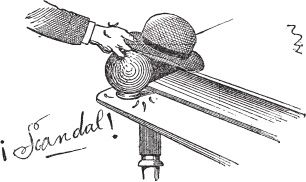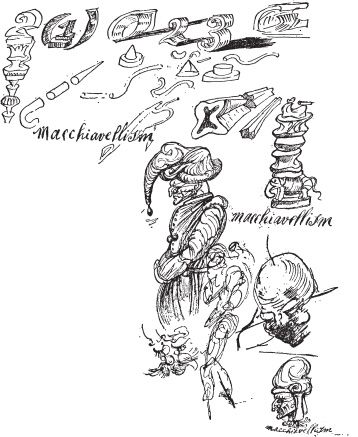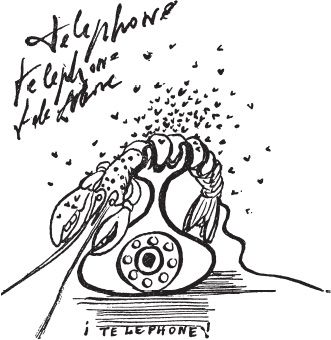The Secret Life of Salvador Dali (57 page)
Read The Secret Life of Salvador Dali Online
Authors: Salvador Dali

Bunuel had just finished
L’Age d’Or
. I was terribly disappointed, for it was but a caricature of my ideas. The “Catholic” side of it had become crudely anticlerical, and without the biological poetry that I had desired. Nevertheless the film produced a considerable impression, especially the scene of unfulfilled love in which one saw the hero, in a state of collapse from unsatisfied desire, erotically sucking the marble big toe of an Apollo. Bunuel left post-haste for Hollywood with dreams of conquest, and the
première
of the film was performed without his presence.
The audience was almost wholly sympathetic to surrealism and the performance passed without notable incident. Only a few noisy laughs and a few protests, quickly drowned out by the frenzied applause of the majority of the hall, marked the passionate tension with which our work was received. But two days later there was a different story. At one point in the film there was a scene showing a luxurious car coming to a stop, a liveried servant opening the door and taking out a monstrance, which one saw, in a close-up, deposited on the edge of the sidewalk. A pair of
very beautiful woman’s legs then appeared coming out of the car. At this moment, at a pre-arranged signal, an organized group of the “King’s Henchmen”
6
proceeded to toss bottles full of black ink that went crashing into the screen. Simultaneously, to the cries of “Down with the Boches!” they fired their revolvers in the air, at the same time throwing stench and tear-gas bombs. The film had shortly to be stopped, while the audience was beaten with blackjacks by the
Action Française
demonstrators. The glass panes of all the doors of the theatre were smashed, the surrealist books and paintings exhibited in the lobby of the theatre (Studio 28) were completely wrecked. One of my canvases was miraculously saved by an usher, who when the fracas began, had seized it and thrown it into the lavatory. But the rest were mercilessly torn to shreds after the glass protecting them had been crushed by heels. When the police appeared the wreckage was complete.
The following day the scandal burst in all the papers, and it became one of the most sensational events of the Paris season. Fiery polemics broke out everywhere, leading to the complete banning of the film by special order of the police commissariat. For some time I had occasion to fear that I would be banished from France, but almost immediately there was a reaction of public opinion in favor of
L’Age d’Or
. Nevertheless everyone preserved a holy fear of undertaking anything with me. “With Dali you never know. Might as well not start an
Age d’Or
all over again.”

The scandal of
L’Age d’Or
thus remained suspended over my head like a sword of Damocles, and also, like this sword, prevented me later from stammering, “I’ll never collaborate with anyone again!” I accepted the responsibility for the sacrilegious scandal, though I had had no such ambition. I should have been willing to cause a scandal a hundred times greater, but for “important reasons”—subversive rather through excess of Catholic fanaticism than through naïve anticlericalism. Nevertheless I realized that in spite of everything the film possessed an undeniable evocative strength, and that my disavowal of the film would have been understood by no one. I therefore resolved to accept all the consequences
of this incident,
7
while I planned to deflect its subversive side in the direction of my budding reactionary theories.
I had just made
L’Age d’Or. I
was going to be allowed to make
The Apology of Meissonier in Painting
. With me no one could ever tell where humor ended and my congenital fanaticism began, so that people soon got used to letting me do whatever I wanted, without discussion: “That’s just Dali!” they would say, shrugging their shoulders. But meanwhile Dali had said what he wanted to say, and this thing that he had just said would quickly devour all the things that were not said or that even though they were said remained as though they had not been said, for most of them were already dead letters before they were even formulated. I was considered the maddest, the most subversive, the most violent, the most surrealistic, the most revolutionary of them all. What a power of darkness behind me, therefore, for the radiance of the day when I would build the whirling sky of the Catholic and luminous geometry of all the hierarchic flesh of the angels and the archangels of classicism!

Besides, my own heaven would always remain more violent and real than the ideal hell of
L’Age d’Or
, just as my classicism would one day be more surrealist than their romanticism! And my reactionary traditionalism more subversive than their abortive revolution.
The whole modern effort that had been accomplished during the Post-War period was false, and would have to be destroyed. Inescapably there must be a return to tradition in painting and in everything. Otherwise spiritual activity would quickly become nothingness. No one knew how to draw any more, or how to paint, or how to write. Everything was on the same level, everything was becoming uniform as it became internationalized. The formless and the ugly became the supreme goddesses of laziness. The empty and pseudo-philosophic gossip of café tables was increasingly encroaching upon honest work in studio and workshop. And the goddesses of inspiration, instead of continuing to occupy their Parnassus imagined and painted by Raphael and Poussin, were expected to come down into the street and ply the sidewalk trade and give themselves over to the libertinism of all the more or less popular assemblages. Artists fraternized with bureaucrats, spoke the language of the most vulgarly opportunistic demagogues, and impudently joined in the ambitions and frenzies of bourgeoisification of the masses who, bursting with scepticism and mechanical progress, waxed fat in the nauseating well-being of a life without rigor, without form, without tragedy and without soul! All this was hostile to me, and did not cease to work like a dog!
1
This was the second time in my life that I encountered the incarnated myth of “La Ben Plantada,” in the person of Lydia, who resuscitated in my childhood memories that of Ursulita Matas.
2
Dentos
, a fish so succulent that fishermen consider it the pork of the sea.
3
Torts, a
variety of small bird, and
rubellons a la llauna
, a kind of mushroom fried on a thin sheet of metal: two of my favorite Catalonian dishes.
4
The correspondence–a symbolic one, at any rate–between the teeth and the sexual organs has been well established. In dreams the losing of teeth, which is popularly interpreted as a death omen, is supposedly a very clear allusion to onanism. Also among certain African tribes the ceremony of circumcision is replaced by that of pulling out a tooth.
5
Málaga is Picasso’s native town, and Picasso’s morphological type is very common there, with the same bull-like expression of intelligence and vivacity.
6
Les Camelots du Roi
, an organization of nationalistic, Catholic and royalist youths belonging to the
Action Française
.
7
Later on, when Bunue! abandoned surrealism, he expurgated
L’Age d’Or
of its frenzied passages and made a number of other alterations without asking me my opinion. This altered version I have never seen.
CHAPTER ELEVEN
My Battle My Participation and My Position in the Surrealist Revolution “Surrealist Object” versus “Narrated Dream” Critical-Paranoiac Activity Versus Automatism

MY BATTLE
Against Simplicity | For Complexity |
Against Uniformity | For Diversification |
Against Equalitarianism | For Hierarchization |
Against the Collective | For the Individual |
Against Politics | For Metaphysics |
Against Music | For Architecture |
Against Nature | For Esthetics |
Against Progress | For Perenniality |
Against Mechanism | For the Dream |
Against Abstraction | For the Concrete |
Against Youth | For Maturity |
Against Opportunism | For Machiavellian Fanaticism |
Against Spinach | For Snails |
Against the Cinema | For the Theatre |
Against Buddha | For the Marquis de Sade |
Against the Orient | For the Occident |
Against the Sun | For the Moon |
Against Revolution | For Tradition |
Against Michelangelo | For Raphael |
Against Rembrandt | For Vermeer |
Against Savage Objects | For Ultra-Civilized 1900 Objects |
Against African-Modern Art | For the Art of the Renaissance |
Against Philosophy | For Religion |
Against Medicine | For Magic |
Against Mountains | For the Coast Line |
Against Phantoms | For Spectres |
Against Women | For Gala |
Against Men | For Myself |
Against Time | For Soft Watches |
Against Scepticism | For Faith |
Already upon my arrival in Paris I realized that the conspicuous success of my exhibition at Goeman’s had had as its chief result the provoking of a regular mobilization of hostilities around myself and my incipient appearance upon the scene. It was as though the unexpected downpour of my imagination, aggravated by the hail-storm of
L’Age d’Or
, had caused the innumerable mushrooms of my enemies to sprout on all sides, while at the same time destroying their crop of fruit.
Who were my enemies? Everyone, or almost everyone, except Gala. What could be called Modern Art, even in surrealist circles, had risen to arms, alarmed by the demoralizing and destructive power which I came to represent. In the first place, my work was violent and audacious, incomprehensible, disconcerting, subversive. In the second, it was not “young” modern art. This much was understood and taken for granted: I had a horror of my epoch! Indeed my anti-Faustian spirit was exactly the contrary of that of the snotty apologists of youth, of dynamism, of the instincts of spontaneity and of laziness, incarnated in the degrading residues of poetic cubism and of the more or less pure plastic art that ravaged the nauseating and sterile terraces of Montparnasse. That gay and modern enterprise,
Cahiers d’Art
, was to remain serenely ignorant of me till the last minute, while old gentlemen with gaiters woven by the mites and the dust of tradition, with white moustaches stained with snuff, with the ribbon of the Legion of Honor in their buttonholes, would pull out their lorgnettes to look closely at a painting of mine and be tempted to walk off with it under their arm, to hang it in their dining-room next to a Meissonier! The oldsters who after fifty years have not become tired of looking, have always liked and understood me. They felt that I was there to defend them. They did not need it; strength was already on their side; and I took my position beside them, knowing that victory would be on the side of tradition. My crusade was for the defense of Greco-Roman civilization.